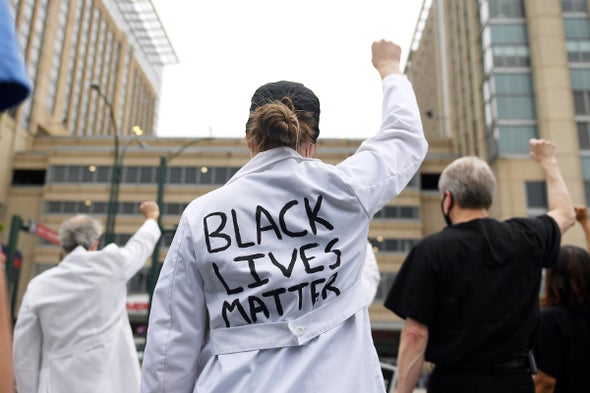
As a physician, climate advocate and health equity educator, I feel like I’ve been sitting within the eye of the storm for months on end. My vantage point has allowed me to see the painful human toll of our country’s intersecting crises. The COVID-19 pandemic, the climate crisis, economic contraction and reckoning on racial justice have converged upon my patients and their communities, resulting in immense human suffering.
My work as a clinician is rooted in studying the best medical literature, educating my patients and caring for the ill to the best of my clinical abilities. But these unprecedented times make it clear that is not enough. I also have a professional responsibility to do a structural and root cause analysis of our current public health crises. Such an analysis makes clear that to turn the page on these dark times, health care professionals and scientists should embrace the work of making structural change. Structural change that improves the social, economic, and planetary underpinnings of health is good medicine, and it's good science.
That's because human health is predicated on a stable, thriving planet. And robust scientific inquiry is predicated on a stable, thriving democracy. Building public health infrastructure, fighting voter suppression, legislating a green economic recovery that ends the use of fossil fuels, and eradicating structural racism are essential medicines that will make us a more fair and healthy society.
While medicine and science have a rich history of advocacy, some in our field have felt that assuming such a public role runs counter to our principles. But things are changing quickly. Publications like this one entered the political debate, endorsing Joe Biden, its first presidential endorsement in its 175 year history. The New England Journal of Medicine, likewise, has published a perspective advocating that the Trump administration be voted out of office because of its historic failures amidst this pandemic and its undercutting of trust in science and public health interventions.
We need scientists and clinicians to testify at the statehouse, write op-eds, protest in the streets and run for public office as an antidote to a corrosive public discourse that has been maliciously corrupted by public figures who make a mockery of our work and threaten to reverse our progress. We must find ways for the studies that live within scientific journals to have impact in a complex world and inform public discourse and policy. Our patients’ lives depend on it. That is especially true of communities of color and poor communities.
Medical and scientific institutions have a responsibility to support their faculty and students in taking on advocacy roles. At the center I help lead, we create courses and space for health care professionals to explore how they can improve their capacity to make change. In our residency training program, doctors in training are required to take a 100-hour advocacy curriculum. Our courses improve knowledge base and skill sets.
But they also ask participants to distill and declare their values, and to reflect on what roles and identities they would like to assume to improve health equity. Our curriculum explicitly seeks to help clinicians find community and shared purpose. It empowers them with a sense of self efficacy—so that they can look at the hard challenges of our time and see within themselves the solutions the world needs. We have found that the inspiration that comes out of such values-based work is a partial answer to the burnout so many health care professionals feel today.
We have found a hunger for this work. And so often, it has been our students who have had the greatest clarity on the path forward. An important part of our responsibility is to create the institutional culture change to nurture these change makers. Often, we should step aside and center their voices.
Our current crises challenge us to have the courage to imagine what is possible in a different kind of world. We didn’t need a virus to animate the harmful and unhealthy fault lines in our society. But we must use this moment in history to do the deep, structural work our patients and future generations deserve. Health care professionals and scientists play an essential role in creating the change that will allow that future to manifest.
"need" - Google News
November 13, 2020 at 07:00PM
https://ift.tt/3nml2I8
Scientists and Health Experts Need to Be Advocates - Scientific American
"need" - Google News
https://ift.tt/3c23wne
https://ift.tt/2YsHiXz
Bagikan Berita Ini
















0 Response to "Scientists and Health Experts Need to Be Advocates - Scientific American"
Post a Comment